Religious Education
RE
Intent
At Bevington Primary School, our Religious Education (RE) curriculum follows the Living Difference III Agreed Syllabus. It aims to support pupils in exploring what it means to live a religious or non-religious life, developing their understanding of belief, practice and belonging across a range of faiths and worldviews.
RE at Bevington promotes:
- Respect and understanding for different beliefs and cultures
- Deep thinking about personal values and ethical issues
- An appreciation of both religious and non-religious perspectives
- Opportunities for pupils to explore their own identity and place in the world
The curriculum is designed around conceptual enquiry, encouraging pupils to reflect on ideas such as community, ritual, sacrifice, justice and freedom. Pupils are supported to engage with the beliefs, stories and practices of Christianity, Islam, Judaism, Hinduism, Sikhism, Buddhism, and Humanism — in ways that are meaningful, age-appropriate and relevant to their lives.
We seek to create thoughtful, reflective and respectful learners who understand the diversity of the society they live in and are equipped to contribute positively to it.
Implementation
RE is taught regularly across all year groups, including the Foundation Stage, where learning focuses on key experiences and early concepts such as celebration, belonging and specialness. As pupils move through the school, they follow the Living Difference III cycle of enquiry, which includes five key steps:
- Communicate – pupils reflect on their own experiences of a concept
- Apply – they explore how the concept relates to others and wider life
- Enquire – they investigate how the concept is understood within a religion
- Contextualise – they examine religious texts, symbols or practices in real-life contexts
- Evaluate – they assess the significance of the concept for believers and for themselves
This enquiry-based approach is adapted appropriately for different ages and developmental stages:
- In Key Stage 1, pupils focus on concepts common to all people (e.g. celebration, belonging)
- In Key Stage 2, pupils investigate shared religious concepts (e.g. worship, God) and begin to explore those distinctive to specific traditions (e.g. Trinity in Christianity, Karma in Hinduism)
RE is planned and delivered in blocked units, with regular opportunities for discussion, drama, storytelling, artefact handling, visits and visitor engagement to bring learning to life. Cross-curricular links are made where appropriate, for example with PSHE, History and English.
The curriculum is inclusive and adapted for pupils with SEND, ensuring all children can access, experience and respond to the concepts and practices explored.
Impact
The impact of our RE curriculum is visible in the respectful, thoughtful and informed attitudes of our pupils. Through RE, they learn to listen carefully, ask meaningful questions, and consider multiple viewpoints. They gain the ability to:
- Articulate their own beliefs and values clearly and respectfully
- Understand and explain key beliefs and practices from a range of religious and non-religious worldviews
- Make thoughtful comparisons and connections between different traditions
- Reflect on how religious and philosophical ideas influence lives, communities and cultures
By the end of Year 6, pupils are well-prepared to continue their study of RE at Key Stage 3 and are equipped with the cultural understanding, empathy and reflective skills needed to thrive in modern Britain and beyond.






